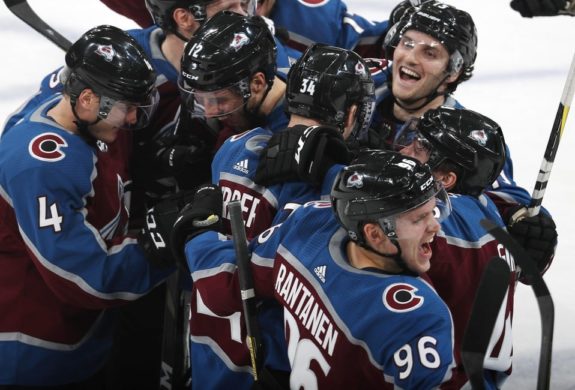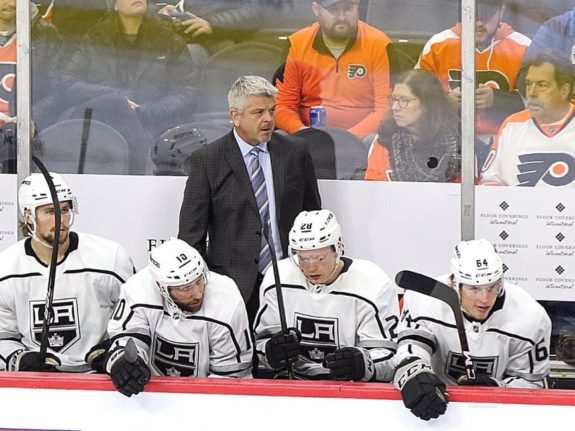When the NHL announced after the 2004-05 lockout that it would institute the shootout to settle tie games, I was intrigued. First, nobody likes ties. As the famous coaching adage goes, “Ties are like kissing your sister.” During the 2003-04 season, 14% of NHL games ended without a winner, even after five minutes of sudden-death overtime. The Minnesota Wild tied 20 games that season, not including the three games they lost in overtime. Second, everybody (except maybe goalies) likes penalty shots, and the new Rule 84.4 specifically incorporated all rules pertaining to “the most exciting play in hockey.”
15 Years of Shootouts
This season marks the fifteenth year of the shootout, and historically the Los Angeles Kings are below average in terms of success. The team’s all-time shootout record of 67-69 places them 20th in win percentage at .493. By comparison, the Colorado Avalanche have been the most successful shootout team over that period, winning at a rate of .637. Only two other teams, the Pittsburgh Penguins and the third-year Vegas Golden Knights have won shootouts at at least a .600 clip.
On the flip side, the Philadelphia Flyers are the NHL’s historically worst shootout team, “winning” shootouts at a rate of .362, which is so bad that the next-worst team, the Ottawa Senators, have a shootout winning percentage of .417.

Why have the Kings historically performed below average in the shootout? It’s not because they can’t put the biscuit in the basket. The Kings are 12th all-time in shootout scoring percentage, successfully converting on 33.1% of attempts. As one would expect, the Avalanche (38.8%) and the Penguins (35.9), who rank first and third in all-time shootout winning percentage, rank first and second, respectively, in shot conversion rate.
Counter-intuitively, the Golden Knights, who rank second in all-time shootout winning percentage, actually rank near the bottom of the league (28th of 31) in all-time shootout conversions, scoring on only 29% of their attempts.
Finally, in the “more things change the more things stay the same” department, the Boston Bruins, who are 0-7 this season in shootouts, are notably in the cellar on the NHL’s all-time shootout scoring percentage ranking, scoring on only 25.2% of attempts. In fact, the Bruins are so bad that this happened to Brad Marchand just last month:
While their shootout offense ranks 12th all-time, Kings goalies have fared far worse defending, which is not unexpected for a team with a sub .500 overall shootout record. The Kings have allowed goals on 33.7% of shootout shots faced, ranked 21st all-time in NHL shootout “defense” (meaning 11th-worst). In 2005-06, the shootout’s first season, the Kings allowed goals on only 14.3% of the shots faced while scoring on 50% of their own shots. Amazingly, the 2016-17 St. Louis Blues connected on seven-of-eight shootout attempts (87.5%) while not allowing a single goal.
Whether the evolution of the shootout favors goalies or skaters is not a question that can be credibly answered without a deep statistical dive. (Please hit me up in the comments below or @MarkDevoreNHL if you would like me to follow up with more shootout analysis.)
This season, the Kings have played in only two shootouts, losing both. Jonathan Quick was in net for both games and did not perform well. He allowed three goals on eight shots, for an opponent conversion rate of 37.5%. However, as a former goalie, I would be betraying the masked brotherhood if I failed to point out that the Kings’ shootout offense has been atrocious (which is worse than “did not perform well”) scoring on only one of eight shots for a conversion rate of 12.5%.
However, because the Kings have played in so few shootouts this season, they haven’t felt it in the standings as very few points have been left on the table. However, under the right circumstances, a team’s performance in the shootout can affect how their season unfolds.
For example, the 2011-12 New Jersey Devils were 12-4 in shootouts. Those 12 extra points helped them secure the final Eastern Conference playoff spot, an opportunity they rode all the way to the Stanley Cup Final where they lost to the Kings in six games. As for the Kings, in 2010-11, they were 10-2 in shootouts (the most single-season shootout wins in team history), which pushed them into the final Western Conference playoff spot by three points.
Although the Kings lost to the San Jose Sharks in the first round of the playoffs that season, those 10 extra points earned by playing .833 shootout hockey was the difference between the making the playoffs and preparing for an early tee time. To quote another old coaching adage, perhaps that shootout success and their run for the last playoff spot taught the team “How to win,” which propelled the Kings to the best three-year span in franchise history, winning two Cups sandwiched between a trip to the Western Conference Final.
The Last Word – My Unsolicited Hockey Advice
Like much of Kings history, the team’s overall performance in the shootout is mediocre, with occasional glory runs. If head coach Todd McLellan ever reaches out to me before a morning skate in El Segundo, I’d suggest that he close each practice with a three-on-three, full-ice scrimmage, and when everyone’s exhausted, go right to shootout practice.

Why? Because the two points up for grabs after the first 60 minutes count as much as two points earned during regulation play.